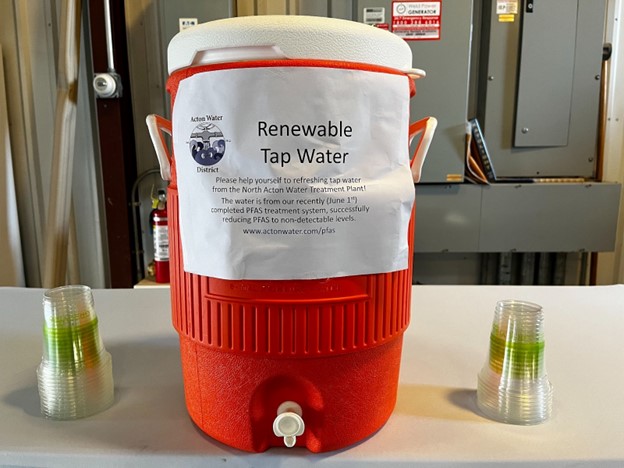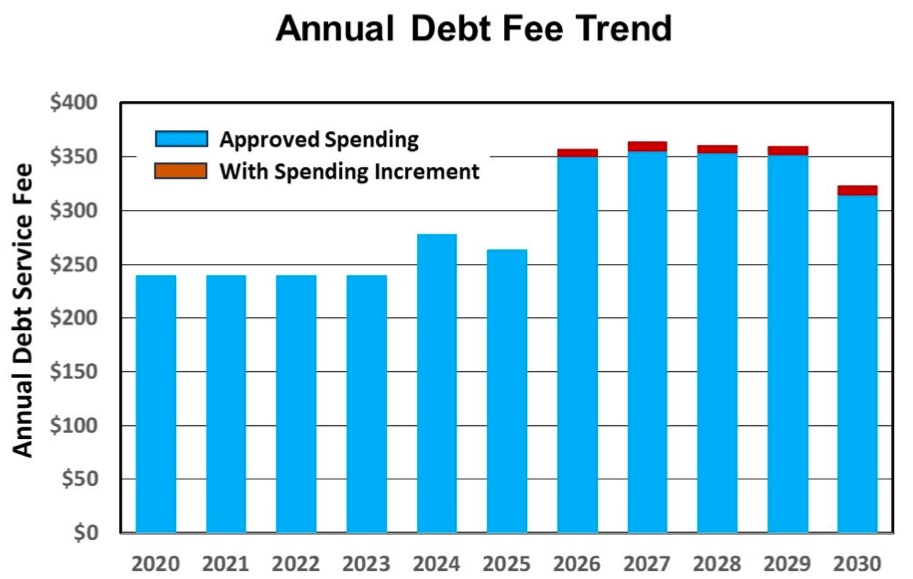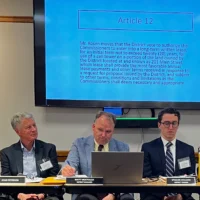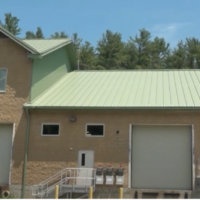The equipment garage at the Acton Water District (AWD) Headquarters was the setting for the June 13 Special District Meeting, at which voters authorized $2.5 million, above and beyond the $7.82 million authorized at a previous District meeting, to install bedrock wells and a PFAS treatment system at the Central Acton Water Treatment Facility. The higher cost of this work was attributed in large part to competition for scarce materials and engineering capacity at a time when public water suppliers across the Commonwealth are seeking to implement PFAS treatment systems. The additional borrowing is projected to add $10 per year per household to the debt fee portion of the water bill.

As voters entered the venue, they were greeted by a huge orange jug dispensing drinking water from the North Acton Water Treatment Plant, which has been providing Acton residents with water containing non-detect levels of PFAS since June 1. This served as a subtle reminder that success is indeed possible in the difficult and expensive battle against PFAS, those “forever” chemicals that are now pervasive in consumer products and natural waters.
Moderator Bill Mullin called the meeting to order and read the full text of the single warrant article, which asked the voters to appropriate $2,532,000 and to authorize borrowing these funds from the Clean Water Trust. Board of Commissioners Chair Barry Rosen explained that the construction bids were higher than had been expected at the time the project was planned because “many municipalities [are] attempting to complete infrastructure projects, including addressing the PFAS issue, at the same time. The flood of federal money and the regulatory environment are likely accelerating this trend.”
Chair Rosen clarified that “the loan is through the Drinking Water State Revolving Fund (SRF) and funded by the Massachusetts Clean Water Trust. The current terms would be for 20 years at a 0% interest rate with the possibility of principal forgiveness since this is to help pay for PFAS mitigation. We would be allowed to increase the amount of the loan by $2.532M under the same terms and conditions if the voters approve the increase tonight.” The Massachusetts Clean Water Trust is a state agency that administers the State Revolving Funds (SRF) which provides low cost loans to municipalities to improve their drinking water, wastewater and stormwater infrastructure. Amid stiff competition, the AWD had won approval for SRF loans for both the Central Acton facility and the South Acton facility, and Rosen’s comment indicates that the agency has agreed to allow this new borrowing to be carried out under the same favorable terms.
John Petersen, Chair of the AWD Finance Committee, reported that after extensive review, his committee unanimously recommended the article. He stated that “the project has been well-managed and the reason for the increased cost, extraordinary cost inflation for PFAS projects, could not have been anticipated.”
The equipment garage venue did not accommodate Powerpoint presentations, but the voters had access to a two-page handout prepared by Treasurer Christine McCarthy detailing project costs, progress to date, and projected impact of this new borrowing on the debt fee. A graph in the handout showed the trend over time in the annual debt service fee, which is the fixed portion of the water bill, the same for every water user. After holding fairly steady around $250/yr from 2020 to 2025, the debt fee is forecast to jump to around $350/yr beginning in FY2026. However, most of this increase is due to borrowing that was already authorized at the FY23 Annual District Meeting (blue bars in graph), with only about $10/yr due to the new borrowing requested at this meeting (red bars).

When the floor was opened to residents, a stream of probing questions poured forth, including:
Q: Is there a chance of getting government money for some of this cost?
A: Yes. The low cost SRF loan is being subsidized at 0% rather than the more typical 1.5 or 2.0%, and there is a chance of partial loan forgiveness. The federal Infrastructure Act is funding state revolving funds, including in Massachusetts, to support costs of PFAS treatment.
Q: Under what conditions will the loans be forgiven?
A: The chances of loan forgiveness are higher for projects to mitigate PFAS. For the North Acton PFAS system, the AWD received 30% loan forgiveness.
Q: When were the bids for this project opened; was it before or after Acton Town Meeting?
A: Bids were opened on May 16, after Acton Town Meeting.
Q: When will the project be completed?
A: Approximately 14 months after initiation, at the end of summer 2025.
Q: Does this project address PFAS throughout the town?
A: The project under discussion tonight addresses water from the Central Acton Water Treatment Facility. The AWD is dealing with three PFAS treatment systems, each of which addresses a different set of wells. The North Acton Treatment Plant is now operational. The South Acton Treatment Plant is proceeding in parallel with the Central Acton project, and came in at $1M under the authorized amount because the design had been simplified.
Q: If the South Acton bids came in at $1M under the authorized amount, why is the AWD asking for $2.5M tonight rather than $1.5M?
A: The SRF authorized the Central Acton project and the South Acton project as separate projects in response to separate proposals, and the two projects’ funds must therefore be kept separate throughout. In the end, if the amount authorized for the all pending work is not all spent, then the debt fee will not increase as much as projected.
Q: Which wells serve the school system?
A: Water from all of the well fields is combined into one interconnected distribution system, so on any given day a school could be receiving water from any of the treatment plants.
Q: Are there AWD wells in West Acton?
A: Yes.
Q: What is their status?
A: At the current time, the District is not pumping water from these wells.
Q: Do you have PFAS levels from the bedrock wells?
A: AWD has been working on the bedrock well project for several years. PFAS levels have been variable, but generally low.
Finally, after more than a dozen questions and detailed answers, a resident “called the question,” moving that the debate be closed and a vote be taken. On a voice vote, the voters approved the warrant article by unanimous consent.
Kim Kastens is a volunteer writer, editor and Board member of the Acton Exchange. She also chairs the Water Committee for Green Acton.



